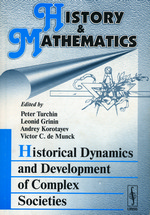
|
History & Mathematics:Historical Dynamics and Development of Complex SocietiesISSN: 978-5-484-01002-0 Bibliography: Moscow: KomKniga, 2006. – 216 p.
Edited by: Peter Turchin, Leonid Grinin, Victor C. de Munck, and Andrey Korotayev
ISBN 5-484-01002-0 Editorial Council: Leonid Borodkin (Moscow State University), Dmitry Chernavsky (Russian Academy of Sciences), Leonid Grinin (Volgograd Center for Social Research), Andrey Korotayev (Russian State University for the Humanities), Alexander Logunov (Russian State University for the Humanities), Gregory Malinetsky (Russian Academy of Sciences), Sergey Malkov (Russian Academy of Military Sciences), Peter Turchin (University of Connecticut)
|
The times of "Pure History" when historians were only interested in the deeds of kings and heroes passed long ago. A more and more important role is played by new directions in historical research that study long-term dynamic processes and quantitative changes. This kind of history can hardly develop without the application of mathematical methods.
This almanac continues a series of edited volumes dedicated to various aspects of the application of mathematical methods to the study of history and society. This edited volume considers historical dynamics and development of complex societies. Its constituent articles treat historical processes at very different levels of scale. Some articles study global dynamics during the last millennia covering the formation and development of the World System. Other articles focus on the dynamics of single societies, or even communities. In general, this issue of the almanac constitutes an integrated study of a number of important historical processes through the application of various mathematical methods. In particular, these articles trace the trajectories of political development from the early states to mature statehood. This almanac also traces trajectories of urban development, and important demographic, technological, and sociostructural changes.
The almanac demonstrates that the application of mathematical methods not only facilitates the processing of historical information, but can also give to a historian a deeper understanding of historical processes.